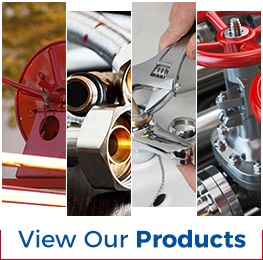
Hoses are flexible tubes that are used to transport liquids, gasses, and solid materials from one place to another. They are vital to the safe and efficient function of a number of industrial processes. Defects in a hose can impair performance, which can have a serious impact on operations.
Leaks are one of the most common types of hose defects. Leaking hoses can cause all sorts of problems. These problems can range from fluid-related property damage and difficulties maintaining pressure within a system to fire and environmental hazards.
Hoses can develop leaks for many reasons. Knowing the causes of hose leaks can help prevent them. In this article, we’re going to discuss some of the reasons hoses start to leak.
Incorrect Hose Size
Hoses must be the correct diameter to ensure proper flow within the system. A high flow rate can damage a hose with a diameter too small to handle the pressure, causing it to begin to leak. It’s also important to use a hose that’s the proper length; using a hose that’s too short can result in damage to the hose and fitting.
Incompatible or Damaged Hose Fittings
To ensure proper function, hoses must be paired with the correct fittings. Incompatible or damaged hose fittings can cause hoses to leak.
Improper Assembly and Manufacturing Defects
Hoses need to be manufactured to exacting standards. Substandard construction can result in leaks. Inconsistent machinery, poor product quality, and inferior raw materials are a few of the factors that can result in defective hoses.
Fluid Incompatibility
Hoses are manufactured to transport specific liquids. Using a hose to transport a liquid that’s incompatible with the hose’s material and construction can result in leaks.
Too Much Bending and Twisting
Too much twisting, kinking, or bending a hose beyond its maximum bend radius can damage the hose, causing it to leak.
External Abrasion
External forces can cause abrasion to the outer surface of a hose, resulting in damage to the hose. Over time, this abrasion can weaken the hose, leading to leaks.
Extreme Temperatures
Extreme hot and cold temperatures can lead to discoloration, cracking, or stiffness, especially if the hose hasn’t been manufactured for these conditions.
Human Error
Cutting or puncturing a hose, poor installation, using the wrong type of hose for an application, and using the wrong kind of fitting are just a few of the human errors that can damage a hose and cause it to start leaking.
Reliable Industrial Hoses and Fittings
One way to avoid hose leaks is to purchase only the highest quality products from reputable, established distributors. ASJ Industrial Hose & Fittings has been a leading provider of reliable industrial hoses and hose fittings (including clamps, connections, valves, and gauges) since 1982. We partner with only the top names in the industry, including Continental, Dixon, and others.
We maintain an extensive inventory at our 24,000-square-foot facility in Corona, CA, so most parts are available for immediate shipping or pick up. Our sales staff is here to ensure you select the right product for your application.
You can get in touch with ASJ Industrial Hose & Fittings at (951) 735-1351 or reach out to us through our website to receive a free quote. If you’re in the Riverside County area, you can visit us at 1033 E. 3rd St..



 Phone:
Phone: